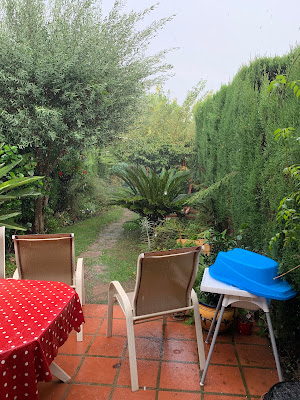No pasarán, they shall not pass, was the rallying cry of republican resistance, especially in Madrid, to the military uprising that led to Franco’s near forty-year dictatorship in Spain.
 |
| They shall not pass! Madrid's defiance to the rebels besieging the city |
Of course, when the rebels won, they gloated ‘ya hemos pasa’o’, ‘we passed’ (dropping the ‘d’ in ‘pasado’ reflects common pronunciation of the word).
Funnily enough, the spiritual heirs of Franco, the hard right Vox Party, used the same words superimposed on a photo of the Madrid town hall, when they took four seats in the municipal council in 2019.
 |
| Vox declares its heredity in a tweet using the Francoist gloat |
One municipality has dropped the film Buzzlightyear from its festival because it shows a kiss between two women. Another has banned a stage play based on Virginia Woolf’s novel Orlando which contains what Vox regards as inappropriate messages about gender fluidity and being gay, though they claim the reason is a budgetary problem no one had spotted before. In the region of Castilla y Léon, run by this coalition for some time now, PP has had to rein in Vox which wanted legislation to force women to have a scan and psychological counselling before they could get an abortion.
Meanwhile, the PP Mayor of Málaga, backed by Vox, has just increased her salary to a tad more than the Prime Minister of Spain’s. In all, some 28 authorities run by the PP, with or without Vox, have upped their pay. To be fair, so have 14 authorities where the social-democratic PSOE is in power, but the PP and Vox were strident in their denunciations of the allegedly spendthrift left, and the Mayor of Málaga has set a remarkable record.
It was in response to its bad showing in the local elections that Pedro Sánchez, the current Prime Minister and leader of the PSOE, called snap elections on 23 July. Now, his government had made errors, notably a new law on sexual consent, a necessary measure but one whose drafting led to the entirely unwanted and unfortunate release of a number of convicted sex offenders from prison. You can imagine the hay the right wing made with that.
It also made a big deal of the fact that the PSOE had formed a coalition with a party of the more extreme left. Even worse, since even in coalition it remained a minority government, it had depended on support from small nationalist movements demanding the independence of their regions, such as the Basque country or Catalonia. That was bad enough, but the right really turned up the heat over Sánchez depending on support from the Basque Party EH Bildu, which includes convicted supporters of the former terrorist organisation ETA, some of them guilty of violent crimes.
All this felt like a heck of a potent barrage from the right. It was hard to see how the left could resist. Some of us might still be saying ‘no pasarán’, but in a whisper, and more as a prayer than in defiance.
“I think I’m going to move to southern Portugal,” my neighbour Nacho told me as we shared a bottle of wine, as we do from time to time.
And then – something happened.
Sánchez stood firm and gave no ground on principles, despite the battering and abuse he was being subjected to. Faced with his firmness, the assault from the right began to fall apart. The leader of the PP, Alberto Nuñez Feijóo, began to make errors. He claimed that PP governments had always uprated pensions in line with the cost-of-living index. It wasn’t hard to prove that was at best false, at worst a lie, and that was pointed out fast. What’s more, photos emerged of his association with Marcial Dorado, later jailed as a drug dealer, who’d taken Feijóo out on sailing jaunts in his yacht on several occasions.
Feijóo made things worse by declaring that he hadn’t known Dorado was a drug trafficker. He claimed that he had only known that he was a smuggler. Still, you can imagine how well it went down among supporters of Feijóo’s party, with their predilection for a hard law-’n’-order line, to hear the leader of their party admit he’d accepted luxurious hospitality from a man he knew was a smuggler.
Today, senior figures of the PP, publicly loyal to Feijóo, are in private criticising the colossal errors he made in the closing stages of the campaign. As well as the gaffes on pensions and Dorado, one that they’re not mentioning but should, is the damaging effect of getting too close to Vox, now revealed as rather too extremist even for some who were previously open to the PP working with them.
Why are all these errors so important? Because Feijóo didn’t achieve the electoral triumph that seemed so likely. It’s true that he won the elections, taking more votes and winning more parliamentary seats than any other party. But even adding 47 seats to take 136 left him far short of a majority, which requires 176. As for Vox, perhaps because it has begun to show its true colours, its holding fell dramatically, by 19 seats to 33.
That means that even together, the two parties don’t command a majority. There are two other right-wing MPs who could take them within five votes, but that’s still not enough. The other MPs are all representatives of parts of Spain that are more or less committed to further autonomy or even independence. Both the PP and Vox have ruled out ever granting them any such thing, so it’s clear they won’t support them into power.
Meanwhile, in a glorious irony, Sánchez managed to avoid losing ground and even added two to the PSOE’s tally of MPs. Though his party is second behind the PP, he’s in a better position to form a government, with the support of the smaller parties, than is Feijóo. The result is that, after spending the campaign denouncing Sánchez and promising to revoke everything he’d done, Feijóo is now turning all polite and respectful towards the PSOE and pleading that they hold back on voting down his attempts to form a government. Quite a glorious turnaround.
And quite a disaster for the right.
Frankly, it couldn’t have happened to a more deserving bunch. Of course, we’re not out of the woods. There may have to be another election. Vox has certainly not disappeared and can make a comeback. Feijóo may be forced out and replaced by the even more hardline President of the Madrid region, Isabel Díaz Ayuso.
 |
| Sánchez celebrating a successful resistance with his supporters |
There are many pitfalls ahead. But at least, for now, we can take courage from the fact that they didn’t pass. For now, no han pasado.
Or pasa’o.
“I’ve postponed my plans to move to Portugal,” Nacho assures me.



















